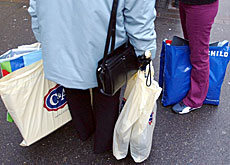Unions campaign against Sunday trading

Trade unions have warned that moves to relax Switzerland's tough Sunday trading restrictions will lead to a seven-day working week across the country.
A nationwide vote is set to take place on November 27 on whether to allow shops at major railway stations and airports to open 365 days a year.
In January a coalition of trade unions, consumer organisations, shopkeepers and churches handed in more than 80,000 signatures to the federal authorities to try to overturn a decision by parliament last September to ease rules on Sunday trading.
Under the changes, shops in major railway stations and airports with sales of more than SFr20 million ($15.5 million) would be allowed to open on Sunday.
Parliament’s decision would affect shops at 25 railway stations and six airports. At present seven railway stations offer Sunday shopping.
Rejection
At a retail trade fair in Lucerne on Tuesday, business leaders unanimously rejected any moves to liberalise Sunday trading.
They said there was considerable evidence that the deregulation of shop opening hours created economic and employment problems.
They also said that unrestricted opening times had a negative effect on small and medium-sized businesses.
On Friday hotelleriesuisse, Switzerland’s hotel owners’ association, said it supported a ban on Sunday trading but admitted that tourists benefited from shops at big stations and airports being open on Sundays.
Support
Earlier in the week a committee of public transport representatives came out in favour of Sunday trading at stations.
Benedikt Weibel, head of the Swiss Federal Railways, argued that the vote in November was not about Sunday trading spreading across the country but about whether people could shop at major Swiss stations seven days a week.
Walter Straumann, head of the “Public Transport for Open Stations” committee, agreed with Weibel that it was not a quesion of scrapping Sunday as a day of rest.
But the Swiss Federation of Trade Unions has taken a strong line on the issue, arguing that parliament’s decision is a first step towards a seven-day working week.
“We have to prevent Sunday work from snowballing,” Paul Rechsteiner, the federation’s president, said in a statement earlier this year.
He added that a majority of employees did not want to see a further increase in working on Sundays because it was not as well paid as regular working hours during the week.
Rechsteiner said work-free Sundays had been a major historical achievement by Swiss unions. Sunday work was banned in principle in Swiss factories as part of labour legislation in 1877.
swissinfo with agencies
September 2004: Parliament decides to ease restrictions on shopping in major railway stations and airports with sales of more than SFr20 million ($15.5 million).
October 2004: Trade unions, church groups and consumer organisations start collecting signatures to challenge the amended law.
January 2005: Opponents hand in more than 80,000 signatures, forcing a nationwide vote.

In compliance with the JTI standards
More: SWI swissinfo.ch certified by the Journalism Trust Initiative












You can find an overview of ongoing debates with our journalists here . Please join us!
If you want to start a conversation about a topic raised in this article or want to report factual errors, email us at english@swissinfo.ch.